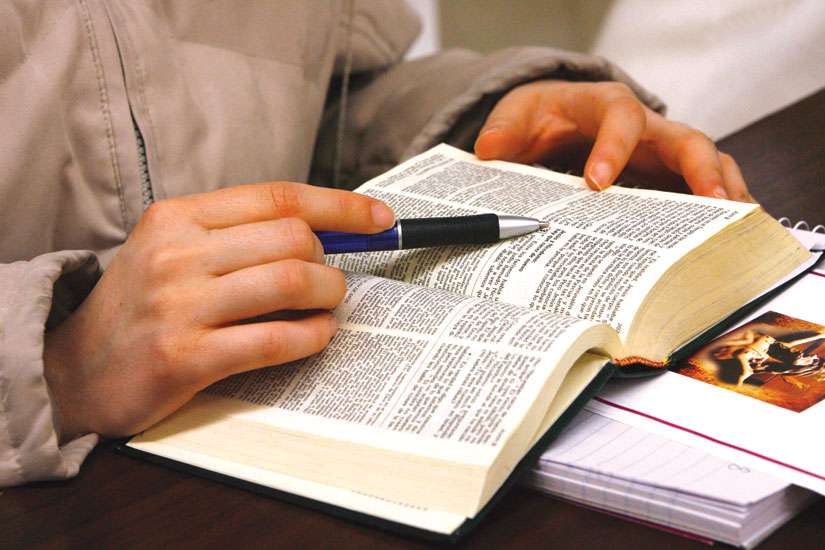The part about how you should enslave the women and kill all the men and boys if the village you are attacking resists has little application when asking your boss for a raise or negotiating a mortgage renewal. Of course, if the village does not resist you must take the more peaceful route of just enslaving everybody. While it may at first seem encouraging that God gives you permission to take the women as your booty, along with children and livestock, it’s hard to apply this principle in a dispute over reserved parking spaces at the office. And at some point more and more women, children and livestock may become problematic. Killing your enemies (Hittites, Amorites, Canaanites, Perizzites, Hivites and Jebusites) so they won’t infect your religious practice with any of their bizarre culture could be seen as an over-reaction when applied to Presbyterians.
The fact is that the Bible was written in a very different place at a very different time by people whose self-understanding and world view was formed by forces we may understand intellectually but we will struggle to feel deep in our guts.
Fortunately for Catholics, the war codes in Deuteronomy never quite make it into the lectionary for Sunday readings. Nobody has to preach on them.
It need not be so, Franciscan Friar of the Atonement Father Elias Mallon told The Catholic Register. It is possible to find some deeper Christian meaning in difficult texts from the Bible. But it requires study and an understanding of the history embedded in biblical literature, which was collected over a 1,000-year span and finally accepted as part of the Bible by about 250 — more than 17 centuries ago.
Mallon was recently in Toronto for a three-way discussion among Catholics, Muslims and Jews about reading and interpreting difficult texts. The event was hosted by the Archdiocese of Toronto.
Mallon is a New Yorker who has spent a lifetime reading, translating and understanding the ancient languages from the dawn of civilization at the confluence of the Tigris and Euphrates Rivers, in what is now Iraq. The Bible and Jewish culture were built in reaction to that harsh world of Gilgamesh and the vast array of angry gods that emerged from Babylon. Having mastered these ancient languages, Mallon gained insights into the Bible and the monotheistic cultures of the three Abrahamic religions. He’s been a contributor to Muslim-Christian dialogue since 1985 and he’s the author of Islam: What Catholics Need to Know.
Learning to interpret tricky, terrible and difficult texts in our sacred Scriptures is not some obscure, academic challenge. When preachers and ordinary believers misinterpret their sacred texts the result is almost always fundamentalism, Mallon said.
“Fundamentalism is probably, and I mean this sarcastically, the ecumenical reality,” he said. “We all have it. It’s a problem for all of us — Christians, Muslims, Jews, Hindus, Buddhists. Right down the line, that’s the problem.”
Fundamentalism is usually the result of reading an ancient, sacred text as if it were a newspaper or a modern textbook — reading the words without any awareness of the culture or the historical circumstances in which they were first spoken.
When Moses urges the people of Israel to take “eye for eye, tooth for tooth, hand for hand, foot for foot, burn for burn, wound for wound, stripe for stripe” (Exodus 21:24-25), the Bible is not urging on vengefulness. It’s trying to limit the violence that was a feature of almost every dispute in the cultures of the ancient world. Blood feuds at that time demanded complete annihilation of an enemy. Every insult was met with the threat of murder extending to entire families. “Eye for eye” was a way of limiting the violence.
A thousand years later, Jesus teaches that limiting the violence is not enough. In the Sermon on the Mount (Matthew 5:38-42) Jesus identifies a kind of border for the Kingdom of God which is established whenever and wherever the violence stops.
“All of our texts are ancient. All of our texts come out of a context,” Mallon said. “It’s a world that wasn’t pluralistic. It was more violent.”
The Islamic State, Boko Haram, Al Shabab, Ian Paisley’s “defensive militia” in Northern Ireland, Lebanon’s Phalange militias in the 1980s, volunteer militias in Jewish West Bank settlements all insist on plucking out bits of sacred texts to justify violence. The only way to prevent violent, fundamentalist readings of the Bible and Quran is to know and preach a more accurate, more sophisticated reading.
“Somebody said once, and I wish it had been me, as soon as you find God loving the things you love and the people you love and hating the things you hate and the people you hate then you know it’s not God,” Mallon said.
The worst readings of sacred literature often come from people trying to read the other religion’s holy book and explain it. When an angry Catholic tells you what the Quran says, a resentful Jew interprets the New Testament or a paranoid Muslim picks at the Bible you can be sure you’re wandering into dangerous misunderstanding.
“A sacred text needs a prayerful, believing reader,” said Mallon.
Living in a pluralistic world, where people with other faiths live on your street, work in your office, run the restaurants where you eat and the stores where you shop, misunderstanding has a price.


